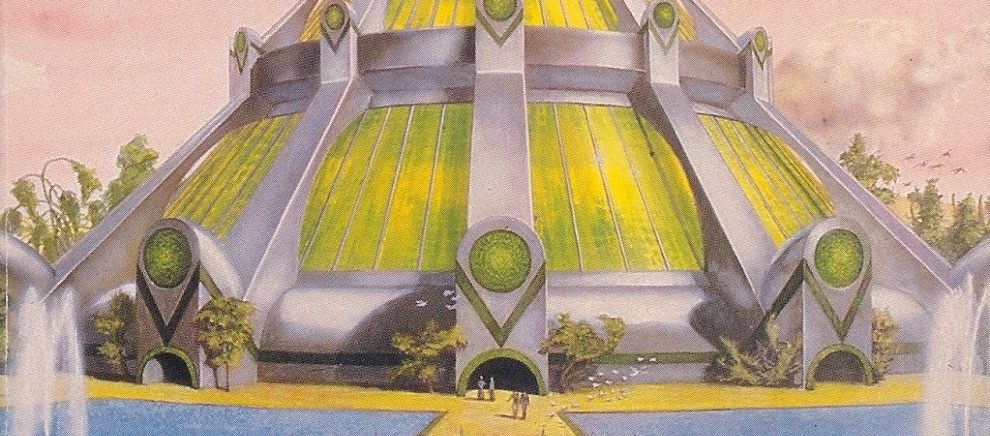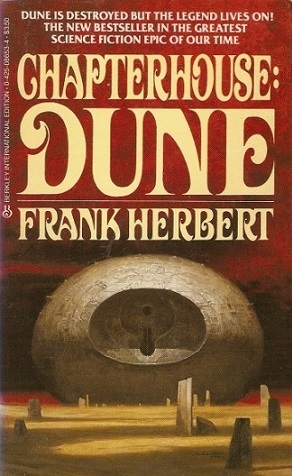

“Education is no substitute for intelligence. That elusive quality is defined only in part by puzzle-solving ability. It is in the creation of new puzzles reflecting what your senses report that you round out the definition.”
Chapterhouse: Dune is the final book that Frank Herbert wrote during his lifetime. It is the first novel in the Dune series to be a direct sequel to the preceding one, picking up immediately after the end of Heretics of Dune. It feels a bit rushed—understandable, as Herbert was battling a terminal illness and was racing against time. While it ties up some loose ends, it regrettably does not provide a fitting end to one of the most enduring science fiction sagas of all time. Though he provided notes and the arc of his six Dune novels was completed by his son Brian Herbert and sci-fi author Kevin J. Anderson with Hunters of Dune (2006) and Sandworms of Dune (2007), for most readers, the series ends with Chapterhouse.1
Chapterhouse begins with the Sisterhood of the Bene Gesserit as the central focus. After the unique and powerful (but glacially paced) God Emperor of Dune, Heretics jumped fifteen hundred years into the future as Honored Matres—a Bene Gesserit and Fish Speaker offshoot group—returned from Leto’s Scattering. While the political intrigues of Heretics were a three-way power struggle between the Bene Gesserit, Honored Matres, and the Bene Tleilax, the latter are more or less unimportant in Chapterhouse, with the focus being almost solely on the struggle between the two sisterhoods.2
Like the entire series, Chapterhouse is packed full of interesting ideas. Frank Herbert had lots of them. But here their presentation is less coherent, less integrated, and so the novel often feels unpolished and incompletely thought out. The book begins with several characters who survived the climax of Heretics reacting to those events, namely the death of the Bashar Miles Teg, who has now been reborn as a ghola. Seemingly out of nowhere, a secret sect of Jews are thrown into the story, having remained hidden throughout the millennia but now allying themselves with the Bene Gesserit. The introduction of Judaism serves a purpose in the story, but it is never fleshed out in a way that feels impactful. The central Jewish character, Rebecca, who enters the Agony and becomes a “wild Reverend Mother,” often seems like her scenes are grafted on.3
Amidst the chaos of jumbled storylines is the introduction of sandworms on the Chapterhouse planet, giving hope that a new Dune could be created. This is the part that is supposed to fill the reader with awe, but we never get a visceral sense of what is happening the way we did through the eyes of Paul and Jessica in the original Dune.
The ghola of Miles Teg, who is re-awakened in another incredibly awkward sex scene (it was awkward enough when it happened to Duncan Idaho in Heretics, but the ghola-Teg is ten years old and has to ride on the shoulders of Bene Gesserit acolyte to see eye-to-eye with adults), doesn’t really do much until the finale.4 The Duncan ghola who has memories of all of his previous lives is a prisoner for most of the novel, having repeated visions of two people, revealed to be a couple named Daniel and Marty in the novel’s final chapter. I thought the intrusion of the vision into Duncan’s calculating mind was a neat idea, but the reveal was a letdown.
Former Honored Matre Murbella, permanently paired to Duncan as they “imprinted” one another, is a central character in the narrative of Chapterhouse. As Mother Superior Odrade’s daring plan to conquer the Honored Matres barely fails its initial phase, the contingency plan kicks in and Murbella must approach the Honored Matres and dupe them into believing she is still one of them and is returning to bring them all the knowledge she gained from the Bene Gesserit. It seemed that as much as the Honored Matres wished to exterminate the Bene Gesserit, they also desired their unique abilities of Voice, poison detection, adjustable metabolism, etc. that the Honored Matres had not been able to develop on their own.
Sheeana, the rider of sandworms from Heretics, also becomes a Revered Mother, though she has tendencies that make her stand out amongst her colleagues, not to mention that she is a source of religious inspiration for many. To complement the thoughts on van Gogh’s painting that cropped up several times in Heretics and a few times more here, Sheeana creates a black sculpture called ‘The Void’ which scares Odrade because it reveals an emotional side to Sheeana that the Sisterhood frowns upon and which she is guilty of herself. This sculpture connects to another one that is hanging in the chambers of the Spider Queen, the Great Honored Matre.
Lucilla is the first character that allows us to get close to the Honored Matres as she is imprisoned with them and constantly interrogated by the Spider Queen. She learns of the Futars, some kind of hybrid cat-human that can only speak in fragments. Though Lucilla inadvertently enrages the Spider Queen and is killed, another Revered Mother, Dortujla, eventually makes her way back to the Sisterhood and explains that she had seen her sisters fed to the Futars. The book’s climax involves Murbella becoming both Great Honored Matre and Mother Superior, pointing toward a future where all Honored Matres are assimilated into the Bene Gesserit.
I think my biggest gripe with the book is that Herbert’s tendency is to keep the reader in the dark for much of the duration, which is fine, but here he fails to give the climax enough power for the whole thing to land properly. To his credit, the finale is engaging; it just doesn’t connect enough with the three hundred plodding pages before it. Too often, dialogue and internal thoughts of characters reference things that the reader could not know, and this can only work if those things eventually come together, which was not achieved to any great degree. Though the book is packed with insights and neat ideas, they are presented here without the crispness apparent in preceding the novels. The usual epigraphs heading chapters are a treat, but the characters themselves are often presenting disconnected thoughts that don’t really impart much to the reader (this one, anyway).
Seek freedom and become captive of your desires. Seek discipline and find your liberty.
The series does not end on its highest note, but the novel is still engaging and worth reading. If the series had ended with God Emperor, I think the series as a whole would have more renown, but Heretics and Chapterhouse are both fine books as well. It is possible that Herbert was building toward an epic seventh and concluding novel that would have addressed many of the issues I had with this book, but we’ll never know, and so the last novel we have from him leaves me feeling a bit empty.
1. The duo has written other books in the Dune universe as well, now totalling more than double Frank Herbert’s original number of books in the series.
2. Scytale, the Tleilaxu Master and Face Dancer who orchestrated the attempt on Paul’s life in Dune Messiah, is present as a ghola (in Heretics we learned that the Tleilax achieved a kind of faux-immortality by continuously replicating themselves as gholas). For the duration of the novel, he is a prisoner aboard a grounded no-ship, his only role as a sounding board for Mother Superior Odrade’s ideas. He carries implanted within his chest a nullentropy capsule with genetic material from numerous people, including many Atreides.
3. When I came across it, I thought the idea came out of left field but could maybe work. After five books worth of the main religions being Zensunni (a cross between Buddhism and Islam) and some remnant of Catholicism, a hidden pocket of Judaism seemed potentially brilliant.
4. The whole ghola-Teg storyline is something that probably would have made me feel uncomfortable without the worldbuilding of the first five books. I don’t know if Herbert painted himself into a corner and had to use the unique elements he had introduced (gholas, re-awakening memories, sexual imprinting) to get himself out, but it certainly would have felt out of place and distasteful earlier in the series (that’s not to say that I did not find it somewhat distasteful here).